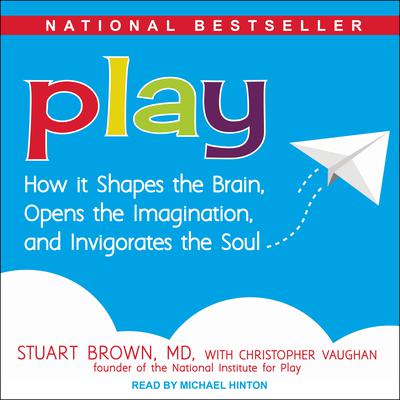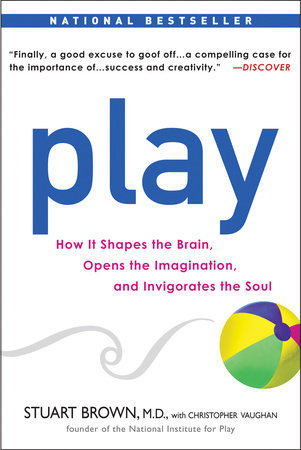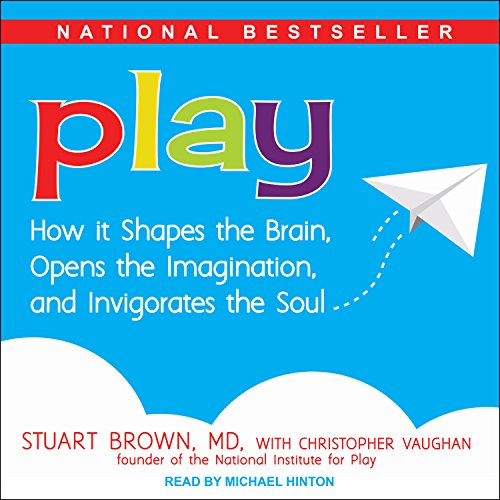Stuart Brown M.D. ‘s “Play” audiobook explores the vital role of play in human development and well-being.
It emphasizes how play shapes our brains and fosters innovation. Play is essential for both children and adults. It enhances creativity, problem-solving skills, and emotional well-being. Stuart Brown M. D. Delves into the science behind play, explaining its neurological and psychological benefits.
He illustrates how play can reduce stress and improve social bonds. His insights are backed by research and real-life examples, making the audiobook a valuable resource. Engaging in play can lead to a more fulfilling and balanced life. The audiobook offers practical advice for incorporating more play into daily routines. This knowledge can transform personal and professional experiences.

Introduction To Stuart Brown’s Perspectives On Play
Stuart Brown, M.D., explores the deep roots and benefits of play. His audiobook Play dives into how play shapes our lives. Play is not just for kids. It is essential for adults too.
The Significance Of Play Across Species
Play is vital for many species, not just humans. Animals like dogs, dolphins, and even birds engage in play. Play helps animals learn and grow. It teaches them survival skills. This is true for humans too. Play helps us learn and connect with others.
Brown believes play is crucial for brain development. It improves creativity and problem-solving skills. Play also reduces stress and increases happiness. All species benefit from play in unique ways.
Biography Of Stuart Brown, M.d.
Stuart Brown, M.D., is a pioneer in the study of play. He began his research after studying violent behavior. He discovered a lack of play in the lives of violent individuals. This led him to explore the positive impacts of play.
Dr. Brown founded the National Institute for Play. He has authored many articles and books on the subject. His work emphasizes the importance of play in everyday life. Dr. Brown’s research shows that play is fundamental for well-being.

The Science Behind Play
In Stuart Brown M.D.’s audiobook, “Play,” the science behind play is deeply explored. Understanding play’s biological and psychological impact can be transformative. Let’s delve into the core aspects that make play essential for all ages.
Neurological Underpinnings Of Play Behavior
Play activates many brain regions. These areas include the prefrontal cortex, which is crucial for decision-making. The release of dopamine during play enhances feelings of joy and pleasure. Play also strengthens neural connections, making the brain more adaptable.
Research shows that play improves memory and cognitive functions. Brain imaging studies reveal that play enhances creativity and problem-solving skills. In short, play is a workout for the brain.
Play’s Role In Development And Learning
Play is vital for child development. It helps in building social skills and emotional resilience. Through play, children learn to navigate complex social interactions.
Educational play can enhance learning experiences. Games that involve puzzles and challenges boost critical thinking. Such activities can make learning fun and engaging.
Play fosters creativity and imagination. Children who engage in imaginative play develop better language skills. This type of play also helps in emotional regulation.
| Benefits of Play | Details |
|---|---|
| Social Skills | Enhances cooperation and empathy. |
| Cognitive Abilities | Improves memory and problem-solving. |
| Emotional Health | Boosts mood and reduces stress. |
In summary, the science behind play highlights its critical role. Play is not just a child’s activity but a crucial aspect of lifelong development and learning.
Play Across The Lifespan
In the audiobook Play by Stuart Brown M.D., the importance of play is explored in detail. Play is not just for kids. It has benefits for people of all ages. Let’s dive into how play impacts both children and adults.
Childhood Play And Its Long-term Impacts
Childhood play is crucial for growth. It helps kids learn and develop. Through play, children learn to solve problems and think creatively. They also learn social skills like sharing and teamwork.
Research shows that kids who play often do better in school. They have better memories and are good at focusing. Play helps their brain grow. It builds strong connections in their mind.
Playing outside is also important. Kids who play outside are healthier. They get more exercise and fresh air. This helps them stay fit and strong.
The Importance Of Play For Adults
Play is not just for kids. Adults need it too. Play helps adults reduce stress. It makes them feel happy and relaxed. It also boosts creativity. Many adults find new ideas while playing.
There are many ways adults can play. They can play sports, games, or even do puzzles. Social play, like playing with friends, is also important. It helps adults build strong relationships.
Play at work can make jobs more fun. It can also make teams work better together. Companies that encourage play often see better results.
| Age Group | Benefits of Play |
|---|---|
| Children |
|
| Adults |
|
Types Of Play
In Stuart Brown M.D.’s audiobook, Play, he explores the various types of play that shape our lives. Understanding these types helps us appreciate the role of play in our development and well-being. Let’s dive into the different patterns and activities of play.
Characterizing Different Play Patterns
Play comes in various forms, each serving unique purposes. Here are some key patterns:
- Rough-and-tumble play: Physical activities like wrestling and chasing.
- Imaginative play: Pretend games where kids create stories.
- Object play: Using toys or objects to build and create.
- Social play: Interacting with others in a playful manner.
- Storytelling play: Sharing and creating narratives.
- Creative play: Engaging in artistic activities like drawing or painting.
The Spectrum Of Play Activities
Play activities span a wide range. Some examples include:
| Type of Play | Description |
|---|---|
| Rough-and-tumble play | Physical interactions that are fun and safe. |
| Imaginative play | Kids create worlds and stories in their minds. |
| Object play | Using blocks, toys, and other items creatively. |
| Social play | Playing with others, learning social skills. |
| Storytelling play | Telling stories, enhancing language skills. |
| Creative play | Artistic activities that spark imagination. |
Each type of play offers unique benefits. Understanding these can help in nurturing a child’s growth.
Benefits Of Play For Mental Health
Stuart Brown M.D.’s audiobook “Play” highlights the crucial role of play in maintaining mental health. Play is not just for kids; adults benefit too. Engaging in playful activities can lead to improved emotional well-being. Let’s explore how play can reduce stress and serve as a therapeutic tool.
Stress Reduction And Emotional Regulation
Play reduces stress by releasing endorphins. These natural chemicals make us feel happy. Engaging in playful activities can lower cortisol levels. Lower cortisol means less stress. Simple games or hobbies can lift your mood.
Play helps in emotional regulation. It allows you to express feelings. During play, you can forget daily worries. This temporary escape is vital for mental health. It creates a balance between work and relaxation.
Play As A Therapeutic Tool
Therapists use play to help patients. Play therapy is effective for children and adults. It helps in expressing emotions safely. Through play, individuals can explore difficult feelings.
Play therapy can uncover hidden issues. It is a non-threatening way to address problems. This method is particularly useful for those who struggle with traditional therapy. Stuart Brown M.D. explains these benefits in his audiobook.

Play In The Animal Kingdom
Play is not exclusive to humans. Animals in the wild also engage in playful activities. Stuart Brown M.D. explores this fascinating subject in his audiobook “Play”. This section delves into how animals play and the benefits they gain from it.
Comparing Human And Animal Play
Both humans and animals engage in playful behaviors for many reasons. For example, puppies play by chasing each other. This helps them develop social skills. Similarly, children play tag to learn teamwork.
Here’s a table comparing human and animal play:
| Aspect | Human Play | Animal Play |
|---|---|---|
| Purpose | Learning social skills | Practicing survival skills |
| Common Activities | Games, sports | Chasing, mock fighting |
| Age Range | All ages | Primarily young animals |
Evolutionary Advantages Of Play
Play offers many evolutionary advantages for animals. It helps them learn essential skills. For example, lion cubs play fight to practice hunting. This prepares them for real hunts in the future.
Here are a few benefits of play:
- Improves physical fitness
- Enhances social bonds
- Develops problem-solving skills
Animals that play often have better survival rates. They are more equipped to handle challenges. Play is crucial for their overall development.
Cultural Variations In Play
Stuart Brown M.D.’s audiobook “Play” highlights how play varies across cultures. Play is a universal activity, yet different cultures have unique ways of engaging in it. Understanding these variations can enrich our appreciation of play’s importance globally.
How Culture Shapes Play
Culture significantly influences the forms and meanings of play. In some cultures, play is structured and rule-bound, while in others, it is free and spontaneous.
For instance, in many Western societies, sports like soccer and basketball dominate. These games often have organized leagues and strict rules. Conversely, in various indigenous cultures, play might involve more storytelling, dancing, and communal activities.
Here’s a comparison table to illustrate how different cultures shape play:
| Culture | Common Play Activities |
|---|---|
| Western | Sports, video games, board games |
| Indigenous | Storytelling, dancing, communal games |
| Asian | Martial arts, traditional games, educational play |
Global Perspectives On Play
Different regions view play in unique ways. In Japan, play often integrates with learning, reflecting the value placed on education. Children engage in games that teach math, language, and cultural history.
In Africa, play frequently involves community participation. Games like soccer are played in open spaces, involving children of all ages. Music and rhythm play a significant role, with many games incorporating singing and dancing.
Here are some key differences:
- Japan: Play merges with education.
- Africa: Play is communal and rhythmic.
- Scandinavia: Outdoor play is highly valued, even in cold weather.
These examples highlight the diversity in play across cultures. Each culture’s approach to play reflects its values and societal norms.
Challenges To Play In Modern Society
In his audiobook, Stuart Brown M.D. addresses the crucial role of play. He highlights the various challenges to play in modern society. These challenges impact both children and adults.
The Decline Of Playtime In Children’s Lives
Children today have less time for play than ever before. Schools prioritize academic achievements over free play. Parents often worry about safety, limiting outdoor activities. Technology also consumes much of children’s free time. This shift affects their social skills and creativity.
| Factor | Impact |
|---|---|
| School | Less recess and more homework |
| Safety Concerns | Restricted outdoor play |
| Technology | Increased screen time |
Reclaiming Play In Adulthood
Adults also face challenges to play. Busy work schedules and responsibilities often take priority. Play is essential for mental health and happiness. Finding time to play can reduce stress and boost creativity.
- Schedule regular playtime
- Engage in hobbies
- Join social groups
Reclaiming play can improve your life significantly. It can bring joy and connections.
Practical Applications Of Play
Stuart Brown M.D.’s audiobook, “Play,” shines a light on the importance of play. It isn’t just for kids. Play has practical applications in daily life and education. Let’s explore how incorporating play can enrich our lives.
Incorporating Play Into Daily Life
Play isn’t only for fun. It helps in reducing stress and improving creativity. Here are some ways to add play to daily life:
- Morning Routines: Start your day with a fun activity. Dance to your favorite song.
- Work Breaks: Take short play breaks. Play a quick game or doodle on paper.
- Family Time: Engage in playful activities with family. Board games or outdoor activities work well.
Making time for play can improve your mood. It can also boost your overall well-being.
Play In Educational Settings
In schools, play can enhance learning. It makes education more engaging and effective. Here are some ways to integrate play into education:
| Activity | Benefits |
|---|---|
| Role-Playing | Helps in understanding different perspectives and improves social skills. |
| Educational Games | Makes learning fun and improves problem-solving skills. |
| Physical Activities | Enhances physical health and boosts brain function. |
Teachers can use playful methods in classrooms. This keeps students engaged and interested in learning.
Play has a significant impact on both personal and educational growth. Stuart Brown M.D.’s audiobook emphasizes this beautifully. By integrating play, we can lead happier and more productive lives.
Concluding Thoughts On Play’s Importance
The audiobook Play by Stuart Brown M.D. is a treasure trove of insights. It emphasizes the critical role of play in human development. Play is not just for children. It affects everyone, from toddlers to adults.
Summarizing Stuart Brown’s Key Messages
Stuart Brown highlights the importance of play in several areas:
- Development: Play shapes our brains and helps us learn.
- Creativity: Engaging in play sparks innovation and creativity.
- Social Skills: Play improves our ability to interact with others.
- Emotional Well-being: It reduces stress and enhances joy.
Brown also discusses the different types of play:
| Type of Play | Description |
|---|---|
| Object Play | Using objects to create and explore. |
| Social Play | Interacting with others in a playful manner. |
| Imaginative Play | Using imagination to create scenarios. |
| Physical Play | Engaging in physical activities for fun. |
Future Directions For Play Research
The future of play research holds many exciting possibilities:
- Technology Integration: Studying how digital play affects development.
- Cross-Cultural Studies: Exploring play in different cultures.
- Play in Aging: Investigating play’s impact on older adults.
- Educational Applications: Implementing play-based learning in schools.
Research will continue to uncover play’s profound impact. Understanding play better can help improve lives. Stuart Brown’s work offers a solid foundation for this journey.
Conclusion
Stuart Brown M. D. ‘s “Play Audiobook” highlights the essential role of play in our lives. This engaging audiobook offers valuable insights. Rediscover the joy of play and enhance your well-being. For a fulfilling life, embrace play’s benefits. Dive into this audiobook and transform your perspective on play today.



